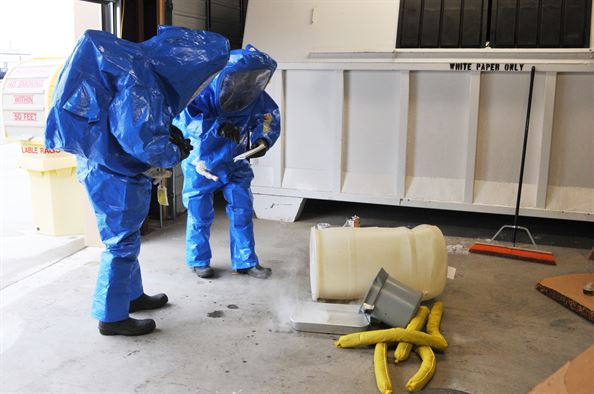- Home >
- Civil, Structural, Engineering Blog >
- Ask an Engineer: When Does a Spill Require Professional Cleanup?

Shield Engineering’s environmental cleanup group, the Action Environmental Group, has worked to remediate minor and complex spills for over twenty years. Offering 24/7 emergency management services for a variety of industries, Action’s team of environmental experts are well-versed in which spills may be handled internally and which spills require professional assistance.
We often get variations of the question, “When does a spill require a professional cleanup?” Here are a few things to consider.
Non-Reportable vs. Reportable Spills
It’s important for anyone working with petroleum or hazardous chemicals to understand the difference between a non-reportable spill and a reportable spill.
Non-Reportable spills are a small-quantity, less than the “reportable quantity” threshold. They don’t pose an immediate threat to public health and the environment, nor do they threaten receptors such as waterways. They can usually be cleaned up in a short amount of time. As such, they are not reportable to the EPA and/or the State where they occur and can often be cleaned up by on-site personnel. However, depending on the characteristics of the material such as flammability, corrosivity, lack of experience by on-site personnel, etc., trained professionals may still be required for non-reportable spill cleanups.
Reportable spills are more serious in nature. They exceed a reportable quantity threshold which is pre-determined by the EPA, the State, and sometimes local governments where they occur. They threaten or impact receptors such as waterways or drinking water wells. Sometimes they can take longer than 24 hours to clean up which triggers some States’ reporting requirements. They can cause an unsafe exposure to a toxic chemical or substance and/or can pose a risk to the environment. These types of spills usually need a professional cleanup. Emergency spill cleanups of hazardous wastes and/or hazardous substances are governed by the rules of OSHA’s Hazardous Waste Operations and Emergency Response guidelines, (Hazwoper) training and should be carried out by Hazwoper trained professionals.
What Differentiates Spills?
There are several factors that should be considered when deciding when to call in environmental professionals.
Quantity/Size of Spill:
If a spill of any material is so large the logistics of cleanup are in question, professional assistance could be needed. Small spills of hazardous materials may also necessitate professional help.
Type of Material:
Spilled hazardous materials and/or wastes require cleanup by Hazwoper-trained professionals. Sometimes the type or nature of the spilled material is uncertain and calling a professional can address the uncertainty of the situation. Other times, on-site personnel may not be comfortable with the cleanup of non-hazardous substances, such as animal by-products, so professional assistance is needed for those releases.
Location of Spill:
Where a spill occurs can be as important as the amount. Spillage of a material into an open drain, for example, can be cause for emergency remediation. In the alternative, the same material spilled into an empty vat might be simple and safe enough to clean in-house.
Source of Spill:
Identifying and understanding the responsible party for a spill can determine whether to get professional assistance involved. Often the source of a spill or contamination is not clear. Our professionals help determine the cause and origin of the spill in order for the correct responsible party or parties to take the lead on the cleanup.
Knowing When to Call for Help
Unfortunately, there is no broad-stroke rule for when to call in hazmat professionals. The Action Environmental Group is available 24/7 to assist with uncertainties.
Ideally, all employees (i.e. manufacturers, producers, transporters, retailers, etc.) who have access to potentially hazardous materials and/or wastes will maintain continuous HAZWOPER certification which provides useful guidance for classifying both non-reportable and reportable spills. In some facilities, colloquial rules such as “If you can step over it, you can clean it,” serve as guidelines for spills, but these should always be adhered to on a case-by-case basis. Proper training and knowing who to call is essential for ensuring people stay safe and compliant in the event of a materials spill.
Do you need help with a spill?
It’s always a good idea to have a reputable emergency management company on speed dial in the event of an emergency situation. Action Environmental is that company.
Call Action Environmental anytime, day or night:
1-800-948-6044


